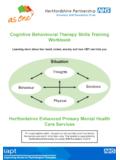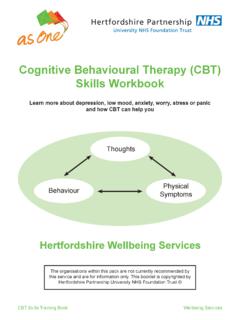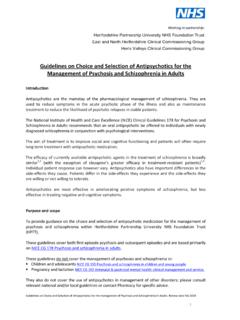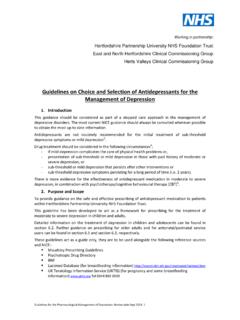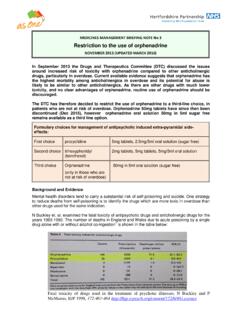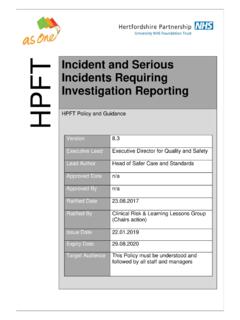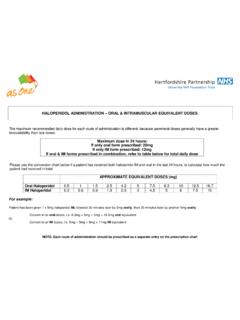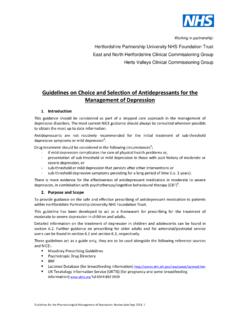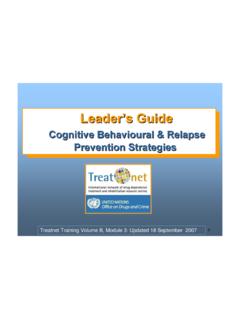Transcription of Cognitive Behavioural Therapy (CBT) Skills Workbook
1 CBT Skills Training BookWellbeing ServicesCognitive Behavioural Therapy (CBT) Skills WorkbookLearn more about depression, low mood, anxiety, worry, stress or panic and how CBT can help youHertfordshire Wellbeing ServicesThe organisations within this pack are not currently recommended by this service and are for information only. This booklet is copyrighted by Hertfordshire Partnership University NHS Foundation Trust ThoughtsBehaviourPhysical Symptoms2 Hertfordshire Partnership University NHS Foundation TrustCBT Skills Training BookWellbeing ServicesSometimes it is common to experience thoughts of very low mood or suicide. If you feel that you mood has deteriorated, and you are unable to manage how you are feeling, please contact the Mental Health Helpline on (01438) 843322, see your GP for an urgent appointment, call 111 or attend your nearest A&E.
2 You can also call the Samaritans on 116 be reassured by contacting the above services you will be able to talk through how you feel and what your options for support website: Partnership University NHS Foundation TrustCBT Skills Training BookWellbeing ServicesContentsIntroductionUnderstandin g depression, low mood, anxiety, panic or worry. ABC ModelSetting goals SMART goalsLifestyle changes Increasing activity levels Behavioural activationFacing your fears overcoming anxiety and panic Containing worryProblem solvingThought challenging Cognitive restructuring Wellbeing blueprintNext StepsFurther Reading- 5- 6- 15- 19- 25- 30- 37- 44- 49- 53- 61- 65- 66 Tool 1 Tool 2 Tool 3 Tool 4 Tool 5 Tool 6 Tool 7 Tool 8 Tool 9 Tool 10 4 Hertfordshire Partnership University NHS Foundation TrustCBT Skills Training BookWellbeing Services5 Hertfordshire Partnership University NHS Foundation TrustCBT Skills Training BookWellbeing
3 ServicesIntroductionThe Wellbeing Service offers support for people who are experiencing difficulties with depression, low mood, anxiety, worry, stress or panic. This Workbook has been designed to be used whilst attending one of our Cognitive Behavioural Therapy (CBT) Skills workshops or with support from your Psychological Wellbeing Practitioner (PWP). Low mood, anxiety, worry, stress and panic can affect many people at different times in their lives. It may be a one-off occurrence or may reoccur on several occasions. It can be a very frightening, unbearable and lonely experience. It can feel as if it will never get any better. It may have taken some time to realise that you are struggling with your mood.
4 The aim of this Workbook is to introduce you to a number of tools that will help you build up your own toolkit to help manage your current symptoms of depression or anxiety and maintain progress towards long-term recovery. The tools covered in this Workbook are based on the principles of evidence based Cognitive Behavioural looks at how your thoughts, physical feelings, emotions and behaviours are all interlinked and have an impact on each other. CBT uses practical strategies to help you make changes which are more positive and realistic. It is very important for you to put these strategies into practice as the more you put in, the more you get out of CBT. You will notice as you read through the Workbook that there are a number of exercises for you to complete.
5 Try and work through these activities spending more time on those that seem more useful to you and your current problems. Speak with your PWP if you experience any difficulties with the Partnership University NHS Foundation TrustCBT Skills Training BookWellbeing ServicesTool 1: Understanding DepressionWhat is depression or low mood?Depression is a distressing experience. Physical symptoms of low mood can affect the way that we think, what we do and how we feel. This can then spiral into a vicious cycle, making it harder to cope, to do the things that we used to do, our thinking continues to be negative or unhelpful. This then reinforces how low we feel physically and thoughts can be very negative when we re depressed.
6 We can be unkind and critical of ourselves. We might overgeneralise or catastrophize, we might jump to conclusions, we might think that we know what other people are thinking (mind reading). We can find it very difficult to see anything positive in our situation, only the bad. We might even think that our feelings are indeed facts. We can feel quite hopeless about the has shown that the main causes for low mood can be linked to genetics, biology, early difficult experiences in life, ongoing stress or life events. Different factors contribute to people s depression but the symptoms are very common to all. It is thought that a combination of low serotonin (a chemical within the brain), inactivity and unhelpful thoughts all lead to depression.
7 Some say it is the body s way of saying we need to do something about tend to default to negative thinking when we are depressed. We may think that other people do not like us. We may withdraw from work or social activities. In the short term is easier to cope with not seeing people or going out. On top of that we may have difficulties sleeping, or eating well. We may feel guilty if we are irritable or grumpy towards our friends and family or if we overeat. Thoughts such as what s the point may make it difficult to motivate ourselves to get up and dressed. When experiencing depression we can also have thoughts about harming ourselves or others. We can think that life is not worth living, wishing that we did not wake up or may have fleeting thoughts about harming or killing ourselves.
8 These kinds of thoughts are a quite common symptom of depression and it can be frightening. If these thoughts become unmanageable and you feel suicidal please see your GP urgently, call 111, call the Mental Health helpline on 01438 843322, or attend your nearest A&E. Contacting these services will enable you to receive the more immediate support needed to help you overcome GP may have prescribed you antidepressants to help you feel better by reducing some of the symptoms of depression. Talk to your GP or PWP if you have any questions about how to manage your medication. By using the CBT techniques within this booklet we hope to help you make those life changes to enable Partnership University NHS Foundation TrustCBT Skills Training BookWellbeing ServicesWhat is low mood?
9 ActivityTake a look at the lists below for some symptoms of low mood. ThoughtsEmotions "I m a failure" Depressed "People think I m stupid" Sad "Nobody likes me" Lethargic "There s no point, I won t enjoy it" Irritable "I might as well not be here" SuicidalPhysical symptomsBehaviours Difficulties sleeping Social withdrawal Poor appetite or over eating Increased smoking or drinking Tearful Decrease in activities Loss of sex drive Sleeping during the dayHow does low mood affect you?8 Hertfordshire Partnership University NHS Foundation TrustCBT Skills Training BookWellbeing ServicesTool 1: Understanding Anxiety What is anxiety?Anxiety is a range of normal though unpleasant emotions. We can feel worried, nervous, uneasy, or we can feel extreme fear, panic or terror.
10 Appropriate levels of anxiety are actually a helpful survival mechanism. Anxiety is designed to alert us to a situation that we need to respond to, if we do not respond there are usually negative consequences, we could be in danger or under threat. These situations might include feeling anxious about an exam or presentation at work, for which we can respond to by preparing and practicing for. Anxiety also can be more sudden and acute in some circumstances such as when we are about to cross the road and we hear the beeping of a car before we step out. Our response is to jump out of the way to examples highlight how anxiety provides the driving force behind motivation and keeps us safe from harmful situations.
